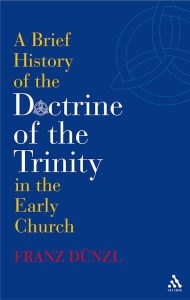 Takeaway: Doctrine is the attempt to speak of God faithfully to our culture, but it is limited to the tools that are available to our language, philosophy and culture.
Takeaway: Doctrine is the attempt to speak of God faithfully to our culture, but it is limited to the tools that are available to our language, philosophy and culture.
Speaking of God is difficult. There is one group of people that believe that God is so Other that we can only talk about what God is not. And they have a point. God is far beyond our comprehension.
But God has revealed himself to us. There is both scripture, which is God speaking in human language through the writing of dozens of God’s followers. And then there is Jesus Christ, which was God himself come to earth to reveal God’s nature and love to us.
This very helpful book, details the early working out in human language the nature of the Trinity. It is important to remember that what was being done was not creating the Trinity. The Trinity exists independent of human language. But the early church had to figure out a way to speak of the Trinity using human language and philosophy.
A clear theme of this book is misunderstanding. The early church would have spoken a variety of languages. Aramaic, Greek and Latin would have been the most common. But the church rose at a time when the common language was shifting from Greek to Latin. The Eastern parts of the church continued to speak Greek. But by 200-300 most of the Western church was speaking Latin as their native language. Many of the early controversies were about disagreements over minor phrases that were accentuated by the fact that the subtleties of languages do not translate well between languages.
The main issues of the Trinity in the first 400 years of the church were three areas. 1) How to express the Trinity and maintain a concept of Monotheism. Or how is God both three and one at the same time. 2) What does begotten mean? We have in scripture that Jesus Christ is the only begotten. So is he the first creature of creation (and therefore less than God the Father)? 3) Related to the second problem, how are the Father and the Son related to one another? If the Father is the same nature as the Son, then how can Christ be human and if they are different natures that allows Christ to be human and an intermediary between humanity and the Father?
(It is interesting to note that the nature of the Holy Spirit was barely mentioned until around 380.)
These are not simple problems. I will not detail it here, but Dunzl shows that early conceptions of the Trinity did not have the philosophical language that later attempts had. The language changed in part because the philosophical systems changed. (Dunzl does not touch on this, but this is essentially the same issues with why early church did not talk about the social nature of the Trinity until much later.)
Dunzl also spends a good bit of time talking about how the political events in the Roman Empire also affected the way that the Doctrine of the Trinity were developed as well as the church tensions in the early councils. I very much appreciate Dunzl’s time talking about the political and cultural issues around the discussion. Too often we talk about doctrine absent of culture as if culture did not affect the way we speak of doctrine.
This is not an easy book to read (it is a translation, the book was originally written in German), but it is well worth the struggle to understand the history, theological, political and philosophical issues. Doctrine is the struggle to put in human language our understanding of God. Necessarily that doctrine is tied to a particular language and culture. We can try to move doctrine from one culture to another. But apart from a good understanding of how the doctrine was developed, it is difficult to communicate that doctrine to a new culture.
At this point we are at least 1500 years from the culture of the early church. As a result our doctrine, that is trying to faithfully communicate our understanding of God, must use different language (or if it uses similar language, it means slightly different things.) Dunzl does the church a great service in communicating in fairly accessible language the issues of the early church.
I would like to find a similar book that deals with the Trinity of the from 400 to the Reformation. If anyone has a suggestion I would love to hear it.
Purchase Links: Paperback, Hardcover (This is not a cheap book. It is worth reading, but look around and see if you can find it used.)
Related articles
- Historical Theology by Gregg Allison – The Trinity (bookwi.se)
- Our Triune God: Living in the Love of the Three in One by Philip Ryken and Michael LeFebvre (bookwi.se)

Nice review. Glad that it was a worthwhile read. Perhaps I’ll finally get to this when my term comes to an end in a couple weeks.
In volumes 2 and 3 of the Cambridge History of Christianity there are chapters on the Trinity (vol 2, part 4) and visions of God (vol 3, part 5). They might fill in some of the gaps up to Aquinas.